动词的语态专题
2023年高考英语考前必练 谓语动词的时态语态(含近三年真题及解析)
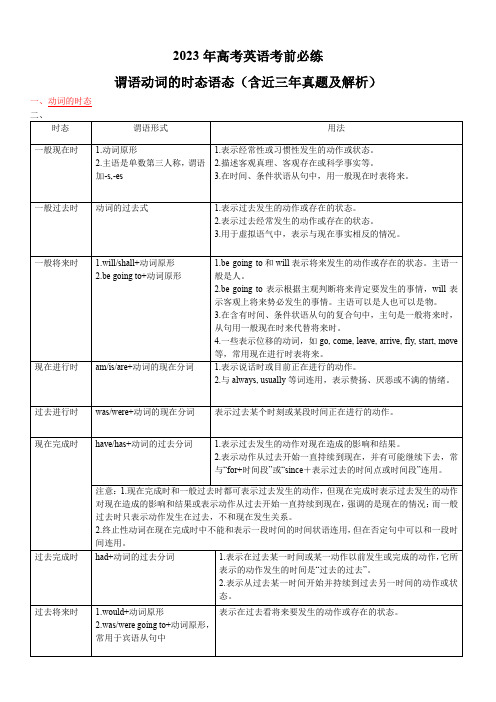
2023年高考英语考前必练谓语动词的时态语态(含近三年真题及解析)一、动词的时态特殊用法1.在时间、条件和让步状语从句中,如果主句谓语动词是一般将来时,从句用一般现在时。
如:We’ll have a picnic if it is fine next Sunday.如果下个星期日天气晴朗,我们将去野餐。
I’ll call you as soon as I get to Beijing tomorrow.我明天一到北京就给你打电话。
2.某些表示起始、往返、出发、到达之意的动词,可用一般现在时表示按规定、计划或安排将要发生的动作(此时一般都有一个表示未来时间的状语)。
这类动词有:begin, come, go, leave, start, arrive, end, stop, open, close等。
如:The meeting begins at 2:00 p.m. tomorrow.这个会议明天下午2点开始。
The next train leaves at 7 o’clock this evening.下一列火车将在今晚7点离开。
3.现在进行时与always, continually, forever等副词连用,表示反复出现或习惯性的动作,这种用法往往表达说话人的某种感情,如赞扬、遗憾、讨厌或不满等。
如:The rich woman is always laughing at the poor.这个有钱的夫人总是嘲笑穷人。
4.现在完成时中表示短暂动作的动词不能与for, since等引导的时间状语连用。
如与一段时间连用,要把瞬间动词转化为意思相近的延续性动词。
常见的变化有:特殊用法1.open,lock,write,read,sell,clean,wash,cut,drive等词作不及物动词时,它们的主语为物,可用主动语态表示被动意义。
如:This kind of pen writes very smoothly.这种钢笔写起来很流畅。
初中英语语法专项8动词的时态和语态

【中考考点】
(1)动词的第三人称单数形式、过去式、过去分词和现在分词的构成。 (2)动词的八种时态的基本结构及用法。 (3)动词的被动语态的基本结构及用法。 (4)动词的主动形式表示被动意义的用法。
动词的时态
考点一 一般现在时
1.结构 一般现在时主要用动词原形表示(当主语是第三人称单数时,谓语动词用第三人称单数形式)。 2.动词的第三人称单数形式变化规则 (1)直接加-s。如:work—works (2)以“辅音字母+y”结尾的词,先变y为i,再加-es。如:carry—carries, cry—cries, try—tries, study—studies (3)以s, x, o, ch, sh结尾的词加-es。如: pass—passes, fix—fixes, go—goes, do—does, teach—teaches, wash—washes (4)特殊:have—has, are—is
动词的时态
考点四 过去将来时
1.结构 would+动词原形 was/were+going to+动词原形 2.用法 表示从过去的某一时刻看,将要发生的动作。 His uncle said that there would be a good harvest the next year.他叔叔说第二年会有一个 好收成。 【注意】 在由if引导的条件状语从句中,如果主句用过去将来时,那么if从句需用一般过去时代替过 去将来时。 If he were here, he would show us how to do it. 如果他在这儿,他就会向我们展示该如何做。
动词的时态
4.动词过去式的变化规则 (1)一般情况下,在动词原形后加-ed。如: watch—watched (2)以不发音的字母e结尾的加-d。如:live—lived (3)以“辅音字母+y”结尾的,变y为i,再加-ed。如: study—studied, carry—carried, cry—cried (4)以重读闭音节结尾,且末尾只有一个辅音字母的,先双写该辅音字母,再加-ed。如: stop—stopped, plan—planned, prefer—preferred (5)不规则动词的过去式需特殊记忆。
动词的主动语态和被动语态用法详解

动词的主动语态和被动语态用法详解动词是句子的中心,表示动作或状态。
在英语中,动词有两种语态:主动语态(active voice)和被动语态(passive voice)。
通过使用不同的语态,我们可以改变句子的重点和结构。
本文将详细介绍动词的主动语态和被动语态的用法及特点。
一、主动语态的用法主动语态表示主体直接进行动作,强调主体的主动性和行为的执行者。
1. 陈述句主动语态的陈述句通常是由主语+动词+宾语的形式构成。
例如:- They eat apples.(他们吃苹果。
)- She writes a letter.(她写信。
)2. 疑问句主动语态的疑问句通常是由助动词+主语+动词的形式构成。
例如:- Do you like ice cream?(你喜欢冰淇淋吗?)- Does he speak French?(他会说法语吗?)3. 否定句主动语态的否定句通常在助动词前加上not。
例如:- They do not play soccer.(他们不踢足球。
)- She does not watch TV.(她不看电视。
)二、被动语态的用法被动语态表示主体是动作的承受者,强调动作对主体的影响和结果。
1. 陈述句被动语态的陈述句通常是由宾语+be动词+过去分词构成,并且常常省略主语。
例如:- Apples are eaten.(苹果被吃了。
)- The letter was written.(这封信已经被写了。
)2. 疑问句被动语态的疑问句通常是由be动词和主语颠倒位置构成,并且常省略by短语,表示不知道动作的执行者。
例如:- Are you invited to the party?(你被邀请参加派对了吗?)- Was the book taken?(这本书被拿走了吗?)3. 否定句被动语态的否定句通常在be动词后加上not。
例如:- Apples are not eaten.(苹果没有被吃。
)- The letter was not written.(这封信没有被写。
初中英语人教版 中考 语法专题 10 动词的时态和语态
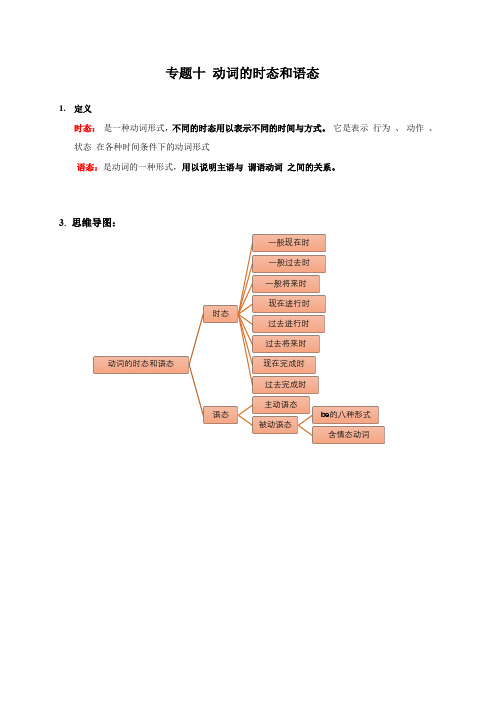
专题十动词的时态和语态1.定义时态:是一种动词形式,不同的时态用以表示不同的时间与方式。
它是表示行为、动作、状态在各种时间条件下的动词形式语态:是动词的一种形式,用以说明主语与谓语动词之间的关系。
3. 思维导图:动词的时态和语态时态一般现在时一般过去时一般将来时现在进行时过去进行时过去将来时现在完成时过去完成时语态主动语态被动语态be 的八种形式含情态动词1.动词的时态1.常考的时态构成及用法a.一般现在时d.现在进行时e.过去进行时f.过去将来时g.现在完成时h.过去完成时2. 动词的语态a. 分类:主动语态:表示主语是动作的执行者被动语态:表示并语是动作的执行者c.主动语态和被动语态的转换规则典型例题总分:50分姓名:得分:1.单选题(每小题1分,共50分)( ) 1. Jenny, together with the Greens the White Tower Park if it tomorrow.A.are going to; isn't rainyB.is going to; doesn't rainC.are going to; won't rainD.is going to; isn't rain( ) 2. The old man for quite some time.A.has diedB.dieC.has deadD.has been dead( ) 3. It is reported that a tall building in the city next year.A.will be builtB.were buildC.have builtD.will build( ) 4. My sister for 2 years.A.has marriedB.have got marriedC.has been marriedD.married( ) 5. Chinese ________in many schools around the world and many people love to learn it.A.teachesB.is teachingC.has taughtD.is taught( ) 6. When Tom was in primary school, he ________the piano every day.A.playsB.playedC.was playingD.has played( ) 7. A baby's first month birthday is a special event in China and _____with a special Party.A.celebratesB.is celebratedC.was celebratedD.will celebrate( ) 8. -Were you at home at 9 o'clock last night?-Yes, I a shower at that time.A.tookB.was takingC.was takenD.am taking( ) 9. National Day celebrations for China's seventieth birthday in about three months.A.will be heldB.will holdC.is heldD.was held( ) 10. We don't know if he tomorrow. If he, I will call youA.will come, will comeB.will come, comeses, will comees, comes( ) 11. He told me that he ______ his uncle in Thailand the next day.A.will visitB.has visitedC.is going to visitD.would visit( ) 12. -Tom, do you know ________? -In Beijing.A.where will the 24th Winter Olympics be heldB.where the 24th Winter Olympics will holdC.where the 24th Winter Olympics will be heldD.where will the 24th Winter Olympics hold( ) 13. Peter with his classmates ________ for the bus when the earthquake happened.A.is waitingB.was waitingC.are waitingD.were waiting( ) 14. his museum ________ here for over 80 years. It ________ one of the oldest buildings in this city.A.is; wasB.had been; isC.was; has beenD.has been; is( ) 15. -Mrs. Brown, how long can books from the school library ?-At most two weeks.A.borrowB.keepC.be borrowedD.be kept( ) 16.-An AI robot _____in our school dining hall next term.-I'm looking forward to it.A.will useB.will be usedC.is usedD.was used( ) 17. Usually a baby's face ____ smooth.A.is feelingB.feltC.feels likeD.feels( ) 18. She _____ an English magazine when I came in.A.readsB.has readC.will readD.was reading( ) 19. I will call you as soon as he______ here.A.arriveB.will arriveC.arrivesD.arrived( ) 20. Boys and girl, ______ learning and have fun!A.keepB.to keepC.keepingD.kept( ) 21. There ______a basketball game between these two grades in the gym this afternoon.A.willB.is going to haveC.is going to beD.will have( ) 22. We ______TV from seven to nine last night.A.were watchingB.will watchC.watchedD.watch( ) 23. Jack's mother taught me how ________ Yunnan rice noodles last weekend.A.to makeB.makingC.makeD.to making( ) 24. Mrs. Green said the plates ________ right away,or they would become difficult to wash.A.will be washedB.should washC.will washD.should be washed( ) 25. The documentary Under the Dome (《苍穹之下》)which ________ by Chai Jing showed us that the air pollution in China was very serious.A.producesB.producedC.is producedD.was produced( ) 26. -What did you do last night?- I ________ my homework and watched TV.A.didB.doC.am doingD.will do( ) 27.The hospital is very famous. It _______ in 2001.A.buildsB.builtC.was builtD.is built( ) 28.These rules are made the disabled.A.protectB.protectedC.to protectD.protecting( ) 29. -How much does the TV ?-Not too much. It's just a second-handed one.A.costB.spendC.takeD.pay for( ) 30. -Have you ever ________ an amusement park?- Yes, I have ________ Fun Times Amusement Park last year.A.been to, have gone toB.gone to, have been toC.go to, went toD.been to, went to( ) 31.We are glad to hear that the terrorists ________ by the brave policemen several days ago.A.are caughtB.were caughtC.have been caughtD.are going to be caught ( ) 32. -Why didn't you go to the party last night? - Because I _____.A.wasn't invitedB.didn't invitedC.haven't invitedD.don't invited ( ) 33. -What _____ you supposed ____ when you are in China?- You should shake hands.A.are, to doB.do, to doC.are, doingD.have, to do( ) 34. So far, we ________ English for three years.A.have learntB.learnC.learntD.had learnt( ) 35.The boy was made ______ the words again and again.A.copyB.copyingC.copiesD.to copy( ) 36. The sports meeting in our school now.A.being heldB.is havingC.is holdingD.is being held( ) 37. The window ____ ten minutes ago, and the room is bright now.A.can be cleanedB.is cleanedC.was cleanedD.will be cleaned( ) 38. -Oh, Mrs. King, your necklace looks nice. Is it new?-No, I _______ it for 2 years.A.hadB.have hadC.boughtD.have bought( ) 39. He has ordered a watch on line for his father and it _______ to him before Father's Day.A.sendB.will be sentC.was sentD.sent( ) 40. There ______ a funny cartoon on CCTV 6 this evening.A.willB.will haveC.is going to beD.is going to have( ) 41. -________ did your uncle leave his home town? -He ___________ for nearly twenty years.A.When, has leftB.When, has been awayC.How long, has leftD.How long, has been away ( ) 42. My uncle ________ Germany on business many times.A.has been onB.has gone toC.has been toD.has been in( ) 43. Her life ________ a lot during the last three years.A.changedB.changingC.has changedD.will change( ) 44. -Lisa was seen ______ an old man go across the street this morning. -What a kind girl she is!A.helpingB.helpedC.to helpD.helps( ) 45. My computer has broken down. I'll get it _______ this afternoon.A.repairsB.repairedC.to repairD.repairing。
高一英语语法动词的时态语态

高一英语语法动词的时态语态高一英语语法动词时态语态1一般现在时1、表示经常发生的习惯性的、现在反复出现的动作或状态,常用的时间状语有:always,usually,seldom,sometimes,everyday,nowandthen,onceaweek等。
2、表示眼下或目前等现在时间所发生的动作或存在的状态,这种状态带有一定的持续性。
3、表示客观事实或普遍真理。
4、书报的标题,的叙述,小说、戏剧、电影等情节介绍,图片的说明等。
6、在时间、条件、方式、让步状语从句中,表示将来的动作。
注意:一般现在时可以用于定语从句或宾语从句中表示将来。
7、用在某些表达中,表示现在正在发生的动作或存在的状态。
高一英语语法动词时态语态2一般过去时1、表示在过去某一时间点发生的动作或所处的状态,与现在没有关系。
常用的时间状语有:yesterday,lastnight,atthattime等。
2、表示在过去某一段时间里反复出现的动作或状态,与现在没有关系。
3、用usedtodo或woulddo表示过去经常或反复发生的动作。
4、有些情况发生的时间没清楚表明,但实际上是“刚才,刚刚”发生的,属于过去时间,应使用过去时态。
常见的有Ididn’tknow…或Iforgot…等。
5、一般过去时可与today,thisweek,thismonth等时间状语连用。
高一英语语法动词时态语态3一般将来时1、will/shalldo(1)表示将来会出现的动作或状态。
常用的时间状语:thisevening,tomorrow,nextweek/month…,attheendofthisterm,inafewminutes等。
(2)表示将来经常发生的动作。
(3)表示事物的固有属性或必然趋势、倾向。
(4)表示说话过程中做出某种决定。
注意:条件状语从句中的will表示“决心,意愿”,此时will是情态动词表示意愿。
2、begoingtodo(1)表示已经决定或安排要做的事。
动词的语态
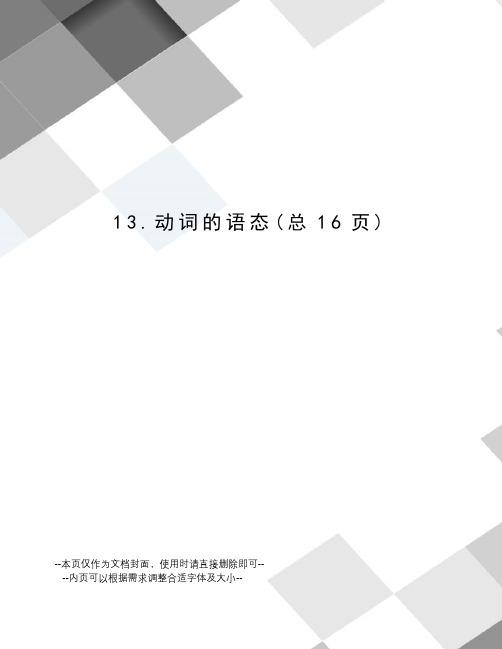
13.动词的语态(总16页)--本页仅作为文档封面,使用时请直接删除即可----内页可以根据需求调整合适字体及大小--动词的语态一、语态的定义和种类语态(voice)是动词的一种形式,表示主语和谓语动词之间的关系。
英语动词有两种语态:主动语态(Active Voice)和被动语态(Passive Voice)。
主动语态表示主语是动作的执行者,被动语态表示主语是动作的承受者。
谓语动词为主动语态的句子叫主动句,谓语动词为被动语态的句子叫被动句。
同一件事情往往可以通过主动句或被动句来表示,侧重点虽有所不同,但意思基本相同。
一般来说,主动语态侧重于行为者,被动语态侧重于动作的对象或动作本身。
例如:主动句:Peter cleaned the meeting room every day. 彼得每天打扫会议室。
被动句:The meeting room was cleaned every day. 会议室每天(由彼得)打扫。
二、被动语态的构成被动语态由“助动词be+ 及物动词的过去分词”构成。
助动词be有时态、人称和数的变化,其变化规则与连系动词be完全一样。
以动词tell为例列表如下:注:英语主动语态的时态共有十六种,而被动语态没有完成进行时,也没有将来进行时态,因此只有上表中的10种。
如果将谓语动词为完成进行时态和将来进行时态的句子变为被动句时,可用完成时态或一般时态表示。
如:1. 用一般时态替代将来进行时态be being discussed …)明天早上这个题目将由我们讨论。
2.用现在完成时态替代现在完成进行时态The machine has been repaired for two hours. (不能用… has been being repaired…)这台机器已经修了两个钟头了。
三、被动语态的否定句、一般疑问句及简略答语构成被动语态的否定结构时,在助动词am, is, are, was, were, have, has, will, shall, would, should后直接加 not;构成被动语态的一般疑问句时,则须将这些助动词提至主语之前,回答用yes或no.如:肯定句:The room was cleaned. 房间扫过了。
中考英语备考 专题03 动词时态及语态(含解析)
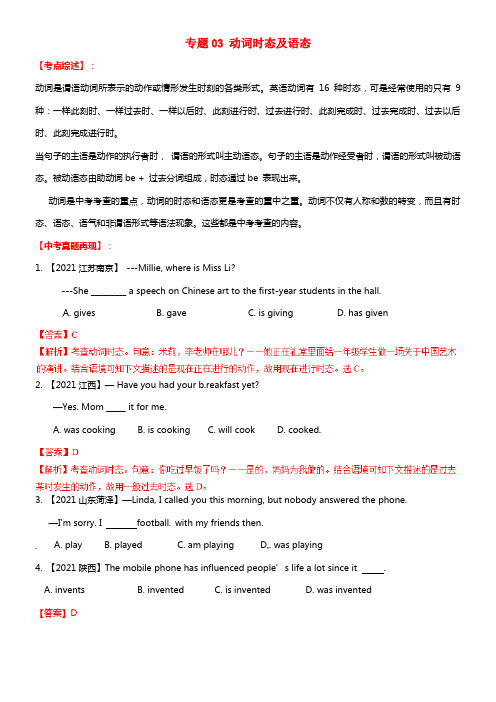
专题03 动词时态及语态【考点综述】:动词是谓语动词所表示的动作或情形发生时刻的各类形式。
英语动词有16种时态,可是经常使用的只有9种:一样此刻时、一样过去时、一样以后时、此刻进行时、过去进行时、此刻完成时、过去完成时、过去以后时、此刻完成进行时。
当句子的主语是动作的执行者时,谓语的形式叫主动语态。
句子的主语是动作经受者时,谓语的形式叫被动语态。
被动语态由助动词be + 过去分词组成,时态通过be 表现出来。
动词是中考考查的重点,动词的时态和语态更是考查的重中之重。
动词不仅有人称和数的转变,而且有时态、语态、语气和非谓语形式等语法现象。
这些都是中考考查的内容。
【中考真题再现】:1. 【2021江苏南京】---Millie, where is Miss Li?---She _________ a speech on Chinese art to the first-year students in the hall.A. givesB. gaveC. is givingD. has given2. 【2021江西】— Have you had your b reakfast yet?—Yes. Mom _____ it for me.A. was cookingB. is cookingC. will cookD. cooked3. 【2021山东菏泽】—Linda, I called you this morning, but nobody answered the phone.—I'm sorry. I football with my friends then.A. playB. playedC. am playingD. was playing4. 【2021陕西】The mobile phone has influenced people’s life a lot since it .A. inventsB. inventedC. is inventedD. was invented【答案】D【解析】考查动词时态及语态。
16种动词的时态和语态

【主动语态】一般现在时:do一般过去时:did一般将来时:willdo现在进行时:be doing(be随人称变化)过去进行时:was/weredoing现在完成时:have/has done过去完成时:had done过去将来时:woulddo将来完成时:will have done将来进行时:will be doing将来完成进行时:will have been doing现在完成进行时:have been doing过去将来完成时:would have done过去完成进行时:had been doing过去将来进行时:would be doing过去将来完成进行时:would have been doing【被动语态】一般现在时:be done(be随人称变化)一般过去时:was/were done一般将来时:will be done现在进行时:be being done(前面的be随人称变化,后面的being固定)过去进行时:was/were being done(being固定)现在完成时:have/has been done过去完成时:had been done过去将来时:would be done将来完成时:will have been done将来进行时:will be being done(being固定)将来完成进行时:will have been being done现在完成进行时:have been being done过去将来完成时:would have been done过去完成进行时:had been being done过去将来进行时:would be being done过去将来完成进行时:would have been being done。
(人教版)中考英语总复习语法:专题8-动词的时态、语态(101页)

(2)过去完成时与现在完成时的主要区别是时间参 照点不同: 过去完成时的时间参照点是某个“过去的” 时间;现在完成时的时间参照点是“现在”。因此现在 完成时中的很多规则,也适用于过去完成时。 When I got to the cinema, the film had been on. 当我到达电影院时,电影已经开始了。
以辅音字母+y结尾的动词, 把y变为i再加-ed
以一个元音字母加一个辅音 字母结尾的重读闭音节词, 双写结尾字母再加-ed
study→studied carry→carried stop→stopped drop→dropped prefer→preferred
3.一般将来时 (1)表示将来某个时间要发生的动作或存在的状 态,其构成形式:“will/shall+动词原形”。常与表 示将来的时间状语tomorrow,next week,in+一段时 间等连用。 当主语是第一人称I或we时,问句中一般用shall。
③表单纯性的将来,与人的主观愿望和判断无关 时。 If it's made of wood, it will float on water. 这要是木材做的,它能浮在水面上。 (4)当主句为一般将来时态时,在if,as soon as, until, when等引导的状语从句中用一般现在时代替一 般将来时。 I will call you as soon as I get there. 我一到那儿就给你打电话。
特殊情况:have→has,am/are→is 考查热点:如果主句为一般将来时,if,unless等 引导的条件状语从句和when,until,as soon as等引导 的时间状语从句常用一般现在时表示将来。 What about going climbing if it doesn't rain tomorrow? 如果明天不下雨,去爬山怎么样?
英语动词被动语态专题练习(及答案)含解析
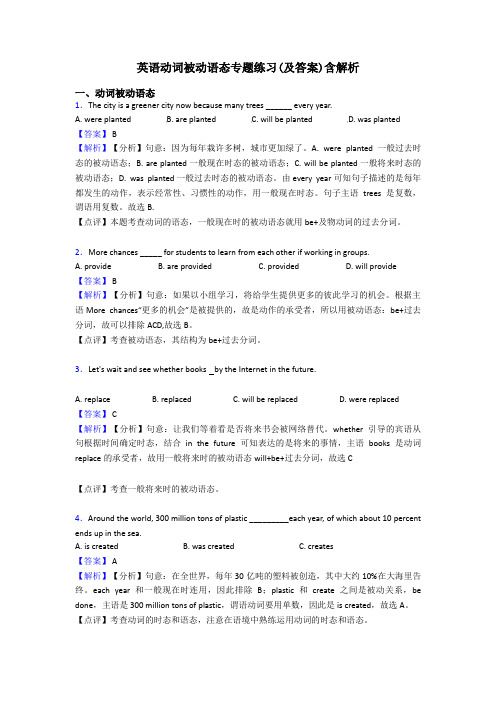
英语动词被动语态专题练习(及答案)含解析一、动词被动语态1.The city is a greener city now because many trees ______ every year.A. were plantedB. are plantedC. will be plantedD. was planted【答案】 B【解析】【分析】句意:因为每年栽许多树,城市更加绿了。
A. were planted一般过去时态的被动语态;B. are planted一般现在时态的被动语态;C. will be planted一般将来时态的被动语态;D. was planted一般过去时态的被动语态。
由every year可知句子描述的是每年都发生的动作,表示经常性、习惯性的动作,用一般现在时态。
句子主语trees是复数,谓语用复数。
故选B.【点评】本题考查动词的语态,一般现在时的被动语态就用be+及物动词的过去分词。
2.More chances _____ for students to learn from each other if working in groups.A. provideB. are providedC. providedD. will provide【答案】 B【解析】【分析】句意:如果以小组学习,将给学生提供更多的彼此学习的机会。
根据主语More chance s“更多的机会”是被提供的,故是动作的承受者,所以用被动语态:be+过去分词,故可以排除ACD,故选B。
【点评】考查被动语态,其结构为be+过去分词。
3.Let's wait and see whether books by the Internet in the future.A. replaceB. replacedC. will be replacedD. were replaced【答案】 C【解析】【分析】句意:让我们等着看是否将来书会被网络替代。
高中语法专题解析动词的时态语态和语法功能

高中语法专题解析动词的时态语态和语法功能高中语法专题解析动词的时态、语态和语法功能动词是语言学中的重要组成部分,它能够表示动作、状态或存在,并具有一定的时态、语态和语法功能。
在本文中,我们将对高中语法中动词的时态、语态和语法功能进行详细解析。
一、动词的时态时态是动词的一个重要语法属性,它用来表示动作或状态发生的时间。
常见的动词时态包括过去时、现在时和将来时。
下面分别对这三种时态进行详细讲解。
1. 过去时:表示动作或状态在过去某个时间内发生或存在。
过去时的构成:(1)一般过去时:动词原形的基础上加上-ed或-d。
例如:walked(走过)、talked(谈论过)(2)过去进行时:be动词的过去形式+动词的ing形式。
例如:was/were walking(正在走)(3)过去完成时:have/has的过去式+动词的过去分词。
例如:had walked(已经走过)2. 现在时:表示动作或状态在现在时间内发生或存在。
现在时的构成:(1)一般现在时:动词原形。
例如:walk(走)、talk(谈论)(2)现在进行时:be动词的现在形式+动词的ing形式。
例如:am/is/are walking(正在走)(3)现在完成时:have/has+动词的过去分词。
例如:have walked(已经走过)3. 将来时:表示动作或状态将要发生。
将来时的构成:(1)一般将来时:will/shall+动词原形。
例如:will/shall walk(将要走)(2)将来进行时:will/shall+be动词的现在分词+动词的ing形式。
例如:will/shall be walking(将要正在走)(3)将来完成时:will/shall+have+动词的过去分词。
例如:will/shall have walked(将要已经走过)二、动词的语态语态是动词的一种形式,用来表示动作的主体与动作所涉及的对象之间的关系,常见的语态有主动语态和被动语态。
动词的时态和语态专题练习

动词的时态和语态专题练习The document was prepared on January 2, 2021高中英语语法时态和语态一.动词的时态时态是谓语动词所表示的动作或情况发生时间的各种形式.英语动词有16种时态,但是常见的只有九种:一般现在时、一般过去时、一般将来时、现在进行时、过去进行时、现在完成时、过去完成时、过去将来时、现在完成进行时.(一)一般现在时do / does1.具体用法1 表示经常性或习惯性动作We always care for each other and help each other. 我们总是互相关心互相帮助.He goes to school every day.2)表示现在的特征或状态He is very happy.Do you sing ----A little.3)表示普遍真理Light travels faster than sound. 光速比声速快.Actions speak louder than words. 行动胜过言语.常与一般现在时态连用的词或短语主要有:often, usually, sometimes, every day, every morning/afternoon, on Sundays/weekends等等.I often go to the cinema on Sundays. 我经常星期天去看电影.He goes to work early every day. 他每天上班很早.二一般过去时 did1表示过去某一特定时间所发生的、可完成的动作或状态,常与表示确切过去时间的词、短语或从句连用.例如:We went to the pictures last night and saw a very interesting film.2表示过去习惯性动作.例如:He always went to class last.I used to do my homework in the library.三一般将来时 will / shall do1表示将来打算进行或期待发生的动作或状态.例如:I shall graduate next year.2一般将来时有时可以表示一种倾向或习惯性动作.如Crops will die without water.You won’t succeed without their support.3 几种替代形式:be going to +v在中广泛使用,表示准备做或将发生的事情.例如:I'm going to buy a house when we've saved enough money.be to +v表示计划安排要做的事,具有"必要"的强制性意义.例如:I am to play tennis this afternoon.be about to +v表示即将发生的事情.例如:He was about to start.be due to +v表示预先确定了的事, 必定发生的事.例如:The train is due to depart in ten minutes.5少数动词如:begin, come, leave, go, arrive, start, stop, return, open, close等的一般现在时可用来表示将来的动作.多用来表示按计划事先安排好即将发生的动作,句中通常还有一个表示将来的时间状语.例如:The meeting begins at seven.The train starts at nine in the morning.四现在进行时 is / are doing1)表示现在某时或某段时间内正在进行的动作.常与现在进行时连用的词组是now, right now,at the mother,for the time being,for the present, 或某个具体的时间几点钟.He is writing a letter now.She is visiting Beijing this week.2)有时用来代替一般现在时态,表示一个经常性动作或状态,这时是为了表示一种感情如赞叹,厌烦,满意,不满等He is always thinking of his work. 表示赞许The boy is always talking in class. 表示不满3 有时用来表示一个在最近按计划或安排要进行的动作这时多有一个表示未来的时间的状语We are leaving on Friday. 我们星期五动身.How many of you are coming to the party五现在完成时have / has done1现在完成时用来表示对目前状况仍有影响的,刚刚完成的动作常与yet,already,just连用,或者过去某一时刻发生的,持续到现在的情况常与for,since连用.例如:I have just finished my homework.Mary has been ill for three days.2常与现在完成时连用的时间状语有:since, for, during, over等引导出的短语;副词already, yet, just, ever, now, before, often, lately, recently等;状语词组this week morning, month, year, so far, up to now, many times, up to the present等.例如:So far, she hasn't enjoyed the summer vacation.There have been a lot of changes since 1978.3完成时态可用在下列结构中:This That, It is was the first second... time +定语从句;This That, It is was the only last + n +定语从句;This That, It is was +形容词最高级+ n +定语从句.如果主句的谓语动词是一般现在时,从句的谓语动词通常用现在完成时;如果主句谓语动词是一般过去时,从句谓语动词通常用过去完成时.例如:1This is one of the rarest questions that have ever been raised at such a meeting.2There was a knock at the door. It was the second time someone had interrupted me that evening.六过去进行时 was / were doing过去进行时表示一个过去的动作发生时或发生后,另一个过去的动作正在进行,或表示过去反复的习惯,常与always,continually,constantly等动词连用.例如:1We were discussing the matter when the headmaster entered.2Whenever I visited him, he was always writing at the desk.七过去完成时 had done1表示过去某时间前已经发生的动作或情况,这个过去的时间可以用by,before等介词短语或一个时间状语从句来表示;或者表示一个动作在另一个过去动作之前已经完成.例如:1We had just had our breakfast when Tom came in.2By the end of last year they had turned out 5, 000 bicycles.2动词expect, hope, mean, intend, plan, suppose, wish, want, desire等用过去完成时,表示过去的希望、预期、意图或愿望等没有实现.例如:I had meant to take a good holiday this year, but I wasn't able to get away.另外两种表示"过去想做而未做的事"的表达方式是:1was / were + to have done sth, 例如:We were to have come yesterday, but we couldn't.2intended expected, hope, meant, planned, supposed, wished, wanted, desired + to have done sth, 如:I meant to have told you about it, but I forgot to do so.3过去完成时常用于以下固定句型:1hardly, scarcely, barely + 过去完成时+ when + 过去时.例如:Hardly had I got on the bus when it started to move.2no sooner +过去完成时+ than +过去时.例如:No sooner had I gone out than he came to see me.3by the end of +过去时间,主句中谓语动词用过去完成时.例如:The experiment had been finished by 4 o'clock yesterday afternoon.八一般过去将来时1. 一般过去将来时的形式Should / would+ 动词原形was / were + 动词-ing形式2. 一般过去将来时常用于宾语从句中,其主语的谓语动词为过去时态,可表示从过去某时看来将要发生的事情,如:He said that he would speak at the meeting.He was sixty-eight. In two years he would be seventy.九现在完成进行时 has / have been doing现在完成进行时表示过去某一时刻之前开始的动作或状态一直延续到过去某一时刻.例如:I have been looking for my lost book for three days, but I still haven't found it.运用动词时态要注意的几个问题一在时间和条件等状语从句中不要用将来时态,如We’ll give him the book if he wants it.He decided to fight back if he was hit again.I’ll call you as soon as I’ve finished my work.二时态的一致时态的呼应,如We saw that the smoke was coming from a window.I didn’t know if she would come.He admitted that he had been on the march.不进行时态调整的情况:1从句说的是一种普遍真理,如:Long ago, people didn’t know the earth moves round the sun.2当从句的谓语改成过去时可能造成误会,如Did he say that the train leaves at 5:30三瞬间动词在完成时态中的使用,如:误:I have received her letter for three months.正:I received her letter three months ago.正:It is three months since I received her letter.四注意某些要求一定时态的句型was/ were doing sth. when …did sth.I was reading a book when the bell rangwas/were about to do sth. when … did sth.We were about to leave when the telephone rang.She was about to go out when it started to rain表示做事做了第几次或共几次,要用完成时态,如:It’s the first time I’ve seen her.We have been there three times.It is / has been… since…It is has been two weeks since I came here.She said it was five hours since she had finished her work.hardly…when…We had hardly got in the crops when it began to rain.Hardly had we got in the crops when it began to rain.no sooner…than…I had no sooner come into the room than the door was closed.No sooner had I come into the room than the door was closed.二.动词的语态语态也是动词的一种形式,英语有两种语态:主动语态和被动语态.主动语态表示主语是动作的执行者,而被动语态表示主语是动作的承受者.1We use electricity to run machines. 主动语态2Electricity is used to run machines. 被动语态1.不能用于被动语态的动词和短语1在英语中,不及物动词不能用于被动语态,但有些不及物动词包括短语容易引起误用.如:appear, belong, belong, die, escape, fall, happen, last, remain, succeed, occur, come true, take place, consist of.2某些表示状态或特征的及物动词,如:become, contain, cost, fit, have, resemble, suit也没有被动语态.2.被动语态的时态形式常用的被动语态有下表所列的几种时态形式.时间一般时进行时完成时现在 am asked am being askedis asked is being askedare asked are being asked过去 was be asked was being askedwere be asked were being asked将来 shall be asked shall have been asked will be asked will have been asked过去 should be asked should have been asked将来 would be asked would have been asked 3.短语动词的被动语态短语动词转换为被动语态时,通常被看作是一个动词,后面的介词或副词不能拆开或省略.例如:1So far no correct conclusion has arrived at.2All the rubbish should be got rid of.4."get + -ed分词"的被动语态"get + -ed分词"结构强调动作的结果,而非动作本身,常用来表示突发性的,出乎意料的偶然事件.例如:The boy got hurt on his way home from work.另外,"get + -ed分词"还可用于谈论为自己做的事,是主动的行为而不是被动的行为.例如:get dressed穿衣服 get divorced离婚get engaged订婚get confused迷惑不解get lost迷路get washed洗脸get married结婚5.被动语态与系表结构的区别1The novel was well written.系表结构2The novel was written by Diskens.被动语态6.不能用于被动语态的及物动词,如:have, fit, hold, lack, cost…I have a computer.The hall can hold 200 people.7. 主动性式表被动意义①当feel、look、smell、taste、sound等后面接形容词时;当cut、read、sell、wear、write等词带状语修饰语时;当动词表示“开始、结束、关、停、转、启动”等意义时.This kind of cloth washes easily.这种布易洗.These novels won’t sell well.这些小说不畅销.My pen writes smoothly.我的钢笔写起来很流畅.The door won’t lock.门锁不上.The fish smells good.鱼闻起来香.②当break out、take place、shut off、turn off、work out等动词表示“发生、关闭、制定”等意思时.The plan worked out successfully.The lamps on the wall turn off.③want, require, need后面的动名词用主动表示被动含义.④be worth doing用主动形式表示被动含义.⑤在“be + 形容词+ to do”中,不定式的逻辑宾语是句子的主语,用主动代被动.This kind of water isn’t fit to drink.The girl isn’t easy to get along with.另外:be to blame受谴责,be to rent出租也用主动形式表被动.Choose the right answer1. They _____ friends since they met in Shanghai.A. have madeB. have becomeC. have beenD. have had2. The secretary is going to report to the manager as soon as he ______.A. will arriveB. arrivesC. is going to arriveD. is arriving3. We all know that ice ______.A. feel coldB. is felt soldC. is feeling coldD. feels cold4. ---This cloth _____ well and _____ long.--- OK. I’ll take it.A. washes ; lastsB. is washed; lastedC. washes, is lastedD. is washing, lasting5. Helen _____ her key in the office so she had to wait until her husband_____ home.A. has left; comesB. left; had comeC. had left; cameD. had left; would come6. It _____ every day so far this week.A. is rainingB. rainedC. rainsD. has been raining7. --- Are you going to the movies tonight--- Yes, I ______ my work by that time.A. will finishB. finishC. am going to finishD. will have finished8. --- Was the driving pleasant when you vacationed in Mexico last summer--- No, it _____ for four days when we arrived, so the roads were very muddy.A. was rainingB. would be rainingC. had been rainingD. has rained9. You won’t know if the coat fits you until you _____ it on.A. will tryB. are tryingC. triedD. have tried10. My dictionary _______, I have looked for it everywhere but still _______.A. has lost; don’t findB. is missing; don’t findC. has lost; haven’t foundD. is missing; haven’t found11. --- How long ______ each other before they _____ married--- For about a year.A. have they known; getB. did they know; were going to getC. do they know; are going to getD. had they known; got12. --- Come in, Peter, I want to show you something.--- Oh, how nice of you. I _____ you _____ to bring me a gift.A. never think; are goingB. never thought; were goingC. didn’t think; are goingD. hadn’t thought; were going13. When Jack arrived he learned Mary _______ for almost an hour.A. had goneB. had set offC. had leftD. had been away14 --- I’m sorry to keep you waiting.--- Oh, not at all. I ______ here only a few minutes.A. have beenB. had beenC. wasD. will15. The police found that the house _______ and s lot of things ______.A. has broken into; has been stolenB. had broken into; had beenstolenC. has been broken into; stolenD. had been broken into; stolen16. --- Have you moved into the house--- Not yet. The rooms ________.A. are being paintedB. are paintingC. are paintedD. are beingpainting17. If the city noises _______ from increasing, people ______ shout to be heard at the dinner table 20 years from now.A. are not kept ; will have toB. are not kept; have toC. do not keep; will have toD. do not keep, have to18. --- ________ the sports meet might be put off.--- Yes, it all depends on the weather.A. I’ve been toldB. I’ve toldC. I’m toldD. I was told19. I don’t think Jim saw me; he ______ into space.A. just stared 凝视B. was just staringC. has just staredD. had just stared20. --- _______ my glasses--- Yes, I _______ them on your bed a minute ago.A. Do you see; sawB. Had you seen; have seenC. Have you seen; sawD. Would you see; saw21. --- We could have walked to the station; it was so near.--- Yes. A taxi _______ at all necessary.A. wasn’tB. hadn’t beenC. wouldn’t beD. won’t be22. --- Who is Jerry Cooper--- ______ I saw you shake hands with him at the meeting.A. Don’t you meet him yetB. Hadn’t you met him yetC. Didn’t you meet him yetD. Haven’t you met him yet23. --- Nancy is not coming tonight.--- But she _______A. promisesB. promisedC. will promiseD. had promised24. _______ it with me and I’ll see what I can do.A. When leftB. LeavingC. If you leaveD. Leave25. It is clear that his poor education _______ him back.A. has been heldB. is holdingC. will be heldD. had held26. --- How are you planning to travel to Shanghai--- I ____ yet, but I ______ taking a train.A. haven’t decided; am consideringB. haven’t decided, considerC. didn’t decided; am consideringD. hadn’t decided; haveconsidered27. The pen I _______ I _______ is on my desk, right under my nose.A. think, loseB. thought , had lostC. think , had lostD. thought, have lost28. --- Have you heard about the new school--- No, when and where to build the new one _______ yet.A. is not decidedB. are not decidedC. hasn’t decidedD. haven’t decided29. --- Sorry, I’m late.--- That’s OK. I _____ long.A. haven’t waitedB. don’t waitC. haven’t been waitingD.didn’t wait30. --- Nancy sat in the front seat on the left side of the classroom.--- Oh I thought she ______ in the back.A. will sitB. had satC. is sittingD. has sat31. I ______ my face when suddenly someone ______ at the door.A. washed, knockedB. washed, was knockingC. was washing, was knockingD. was washing, knocked32. I ______ at the station half an hour ago, but the train _____ yet.A. arrived, hadn’t comeB. was arriving, hadn’t comeC. arrive d, hasn’t comeD. had arrived, didn’t come33. --- Why did you come by taxi--- My car broke down last week and I still _______ it repaired.A. haven’t hadB. didn’t haveC. don’t haveD. won’t have34. I’m surprised to find you here looking well and playing tennis, Jim. Annsaid that you _____ sick.A. areB. wereC. would beD. had been35. The price _________, but I doubt whether it will remain so.A. went downB. will go downC. has gone doneD. was going down36. --- Did you go to Qingdao for vacation last August--- I _______ to go, but I got sick at the last minute.A. was planningB. had been planningC. plannedD. have planned37. I finally got the job I dreamed about. Never in my life _____ so happy.A. did I feelB. I feltC. I had feltD. had I felt38. --- How are you today--- Oh, I ________ as ill as I do now for a very long time.A. didn’t feelB.wasn’t feelingC. don’t feelD. haven’t felt39. The reporter said the UFO ______ east to west when he saw it.A. was travellingB. travelledC. had been travellingD. was totravel40. --- I think that you need ______ practice on playing the violin.--- ______ violin lessons every two weeks, but I think I’ll make it every week from now on.A. less; I haveB. less; I’ve takingC. more; I haveD. more; I’ve been having41. I remember ______ for the job, but I forget the exact number.A. to be paidB. being paidC. get paidD. that I receive pay42. By this time you come, I ______ the task ______ to me last month.A. have finished, givenB. will have finished, to be givenC. will have finished, givenD. have finished, to be given43. There was a knock at the door. It was the second time that someone ______ me that evening.A. to have interruptedB. would have interruptedC. had interruptedD. to interrupt44. ---- It is a long time ______ I saw you last.---- Yes. And it will be a long time ______ we see each other again.A. before, sinceB. since, beforeC. then, thenD. when, when45. We ______ that you would be able to visit us, but you did not.A. hopeB. hopedC. had hopedD. are hoping46. Mary felt both unprepared and nervous about the interview which she______ the next day.A. was bout to faceB. is going to faceC. will faceD. was to face47. In such dry weather, the flowers will have to be watered if they ______.A. have survivedB. are to surviveC. would surviveD. will survive48. ---- Are you member of the club---- ______. It’s ten years since I ______ a member of the club., was B. No, became C. Yes, had been D. No, was49. She ______ law the moment she has finished high school.A. is going to studyB. is to studyC. is about to studyD. will be studying50. The bikes produced in that factory are of high quality. So they ______ well both at home and abroad.A. sellB. are soldC. may be soldD. are to be sold。
动词的语态
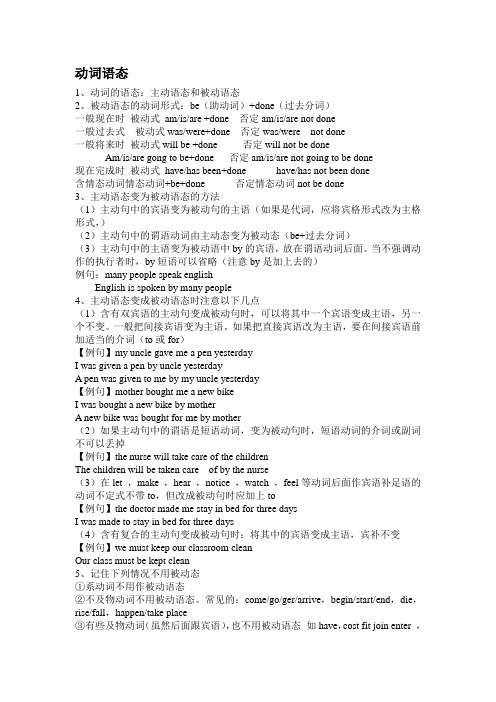
动词语态1、动词的语态:主动语态和被动语态2、被动语态的动词形式:be(助动词)+done(过去分词)一般现在时被动式am/is/are +done 否定am/is/are not done一般过去式被动式was/were+done 否定was/were not done一般将来时被动式will be +done 否定will not be doneAm/is/are gong to be+done 否定am/is/are not going to be done现在完成时被动式have/has been+done have/has not been done含情态动词情态动词+be+done 否定情态动词not be done3、主动语态变为被动语态的方法(1)主动句中的宾语变为被动句的主语(如果是代词,应将宾格形式改为主格形式,)(2)主动句中的谓语动词由主动态变为被动态(be+过去分词)(3)主动句中的主语变为被动语中by的宾语,放在谓语动词后面。
当不强调动作的执行者时,by短语可以省略(注意by是加上去的)例句:many people speak englishEnglish is spoken by many people4、主动语态变成被动语态时注意以下几点(1)含有双宾语的主动句变成被动句时,可以将其中一个宾语变成主语,另一个不变。
一般把间接宾语变为主语。
如果把直接宾语改为主语,要在间接宾语前加适当的介词(to或for)【例句】my uncle gave me a pen yesterdayI was given a pen by uncle yesterdayA pen was given to me by my uncle yesterday【例句】mother bought me a new bikeI was bought a new bike by motherA new bike was bought for me by mother(2)如果主动句中的谓语是短语动词,变为被动句时,短语动词的介词或副词不可以丢掉【例句】the nurse will take care of the childrenThe children will be taken care of by the nurse(3)在let ,make ,hear ,notice ,watch ,feel等动词后面作宾语补足语的动词不定式不带to,但改成被动句时应加上to【例句】the doctor made me stay in bed for three daysI was made to stay in bed for three days(4)含有复合的主动句变成被动句时:将其中的宾语变成主语,宾补不变【例句】we must keep our classroom cleanOur class must be kept clean5、记住下列情况不用被动态①系动词不用作被动语态②不及物动词不用被动语态。
动词被动语态专题复习经典

动词被动语态专题复习经典一、动词被动语态1.Trees and flowers _______ every year to make our school more beautiful.A. plantB. are plantedC. were plantedD. will be planted【答案】 B【解析】【分析】由句中主语“Trees and flowers”为事物可知此处应用被动语态,时间状语为every year,因此用一般现在时,故选B。
2.Teenagers should ________ to take care of themselves from a young age.A. educateB. be educatingC. have educatedD. be educated【答案】 D【解析】【分析】句意:我们应该从小时候就开始教育年轻人照顾自己。
结合语境可知本句主语是动作对象,故用被动语态。
选D。
3.Everybody _________ deeply after they heard the story.A. movesB. movedC. is movedD. was moved【答案】D【解析】【分析】句意:每个人在听了这个故事之后,都被深深地感动了。
根据after they heard the story可知,这里用的是一般过去时,所以主句的时态也用一般过去时,故排除A 和C;everyone与move之间是被动关系,故选D。
4.—Why are you leaving your job?—I can't stand it any longer. I always ____ to work overtime.A. am; askingB. am; askedC. was; askingD. was; asked【答案】 B【解析】【分析】句意:——你为什么要离职?——我再也受不了了,我总是被要求加班。
专题复习———动词语态

Practice
把下列句子变成被动语态:
1) A car knocked him down yesterday.
He was knocked down by a car yesterday.
2)Two doctors and ten nurses make up the medical team.
• They used this room for resting.
This room was used for resting by them.
3.一般将来时的被动语态结构:
1.They will finish the work in ten days.
The work will be finished by them in ten days
The homework is done by Lucy in the evening.
• We make these machines in Beijing.
These machines are made in Beijing.
句式 肯定句:主语+be + 过去分词+(by ~)
否定句:主语+be not +过去分词+(by ~) 一般疑问句:Be +主语+过去分词+(by ~)? 特殊疑问句: 疑问词+be+主语+过去分词+ (by ~)
A talk will be given by the headmaster this afternoon.
4.含有情态动词的被动语态结构:
1.Amy can take good care of Gina .
Gina can be taken good care of by Amy.
can/may/must/should + be+过去分词
高考英语专项复习《动词的时态、语态、情态动词、虚拟语气》真题总结含答案
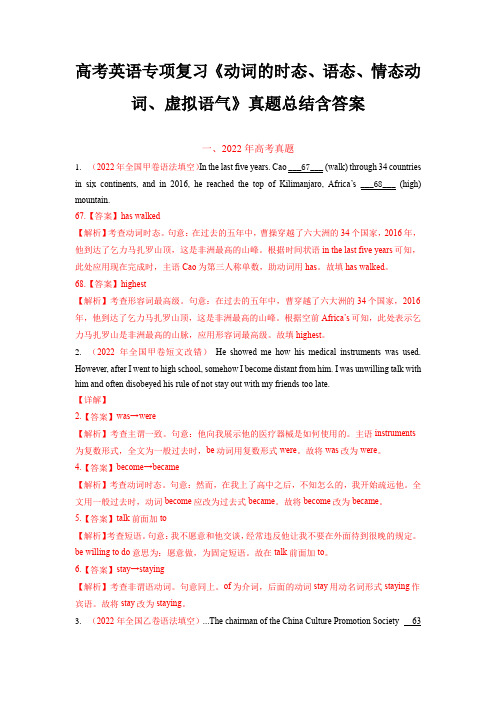
高考英语专项复习《动词的时态、语态、情态动词、虚拟语气》真题总结含答案一、2022年高考真题1.(2022年全国甲卷语法填空)In the last five years. Cao ___67___ (walk) through 34 countries in six continents, and in 2016, he reached the top of Kilimanjaro, Africa’s ___68___(high) mountain.67.【答案】has walked【解析】考查动词时态。
句意:在过去的五年中,曹操穿越了六大洲的34个国家,2016年,他到达了乞力马扎罗山顶,这是非洲最高的山峰。
根据时间状语in the last five years可知,此处应用现在完成时,主语Cao为第三人称单数,助动词用has。
故填has walked。
68.【答案】highest【解析】考查形容词最高级。
句意:在过去的五年中,曹穿越了六大洲的34个国家,2016年,他到达了乞力马扎罗山顶,这是非洲最高的山峰。
根据空前Africa’s可知,此处表示乞力马扎罗山是非洲最高的山脉,应用形容词最高级。
故填highest。
2.(2022年全国甲卷短文改错)He showed me how his medical instruments was used. However, after I went to high school, somehow I become distant from him. I was unwilling talk with him and often disobeyed his rule of not stay out with my friends too late.【详解】2.【答案】was→were【解析】考查主谓一致。
句意:他向我展示他的医疗器械是如何使用的。
主语instruments 为复数形式,全文为一般过去时,be动词用复数形式were。
强化训练31 专题9 动词的时态和语态

Ⅰ.单项选择1.(2022·江西)Don't leave your toys on the table, or I them away.A.threw B.will throwC.have thrown D.was throwingB【解析】句意:不要把你的玩具放在桌子上,否则我就把它们扔掉。
句子用“祈使句,or+陈述句”结构,根据语境可知,此处用一般将来时,其结构为will do。
故选B。
2.(2021·辽宁阜新)We will play football if it this Saturday.A.doesn't snow B.won't snowC.isn't snowing D.didn't snowA【解析】句意:如果这个星期六不下雪,我们就踢足球。
if引导的条件状语从句遵循主将从现原则,此处用一般现在时表将来。
故选A。
3.(2020·云南昆明)Since 1989, Project Hope millions of young people from poor families achieve their dreams of going to school.A.will help B.helpsC.has helped D.is helpingC【解析】根据关键词since 1989可判断,该句子用现在完成时态,have/has +动词的过去分词。
故选C。
4.(2020·辽宁营口)—Be quick, Sara! The taxi is waiting for us outside.—A moment, please.I some visitors our products.A.showed B.am showingC.was showing D.showB【解析】句意:——Sara,快点!出租车正在外面等我们。
专题八 动词的时态、语态

③表单纯性的将来,与人的主观愿望和判断无关 时。 If it's made of wood, it will float on water. 这要是木材做的,它能浮在水面上。 (4)当主句为一般将来时态时,在 if, as soon as, until, when等引导的状语从句中用一般现在时代替一 般将来时。 I will call you as soon as I get there. 我一到那儿就给你打电话。
②表示过去经常或反复发生的动作,常与 always , usually, often, 度的时间状语连用。 When I was a child, I often played football in the street. 当我是个孩子的时候,我经常在街上踢足球。 注:表示过去经常发生或反复发生的动作,也可 用 used to或 would+动词原形。 I used to go to the library every Sunday. 我以前每个周日都去图书馆。 never,sometimes等表示频
(5)动词的现在进行时表将来。 常见的动词有 go, come, leave, stay, start等。 Joe is leaving for London. 乔就要动身去伦敦。
(6)be about to do 结构表示客观、马上就要发生 的事,一般不与具体的时间状语连用。 be to do结构表示按职责、义务和要求必须去做 或即将发生的动作。 The plane is about to take off. 飞机就要起飞了。 Jenny is to be married next month. 珍妮下个月 结婚。
When shall we finish homework? 我们应该什么时候完成作业? I shall make a cake for your birthday tomorrow. 明天我将为你的生日制作一个蛋糕。
- 1、下载文档前请自行甄别文档内容的完整性,平台不提供额外的编辑、内容补充、找答案等附加服务。
- 2、"仅部分预览"的文档,不可在线预览部分如存在完整性等问题,可反馈申请退款(可完整预览的文档不适用该条件!)。
- 3、如文档侵犯您的权益,请联系客服反馈,我们会尽快为您处理(人工客服工作时间:9:00-18:30)。
12. 动词的语态语态有两种:主动语态和被动语态。
主语是动作的发出者为主动语态;主语是动作的接受者为被动语态。
1)若宾语补足语是不带to 的不定式,变为被动语态时,该不定式前要加"to"。
此类动词为感官动词。
feel, hear, help, listen to, look at, make, observe, see, notice,watchThe teacher made me go out of the classroom.--> I was made to go out of the classroom (by the teacher).We saw him play football on the playground.--> He was seen to play football on the playground.2)情态动词+ be +过去分词,构成被动语态。
Coal can be used to produce electricity for agriculture andindustry.12.1 let 的用法1)当let后只有一个单音节动词,变被动语态时,可用不带to 的不定式。
They let the strange go.---> The strange was let go.2)若let 后宾补较长时,let 通常不用被动语态,而用allow或permit 代替。
The nurse let me go to see my classmate in the hospital.----> I was allowed / permitted to see my classmate in thehospital.12.2 短语动词的被动语态短语动词是一个整体,不可丢掉后面的介词或副词。
This is a photo of the power station that has been set up in myhometown.My sister will be taken care of by Grandma.Such a thing has never been heard of before..12.3 表示"据说"或"相信" 的词组believe, consider, declare, expect, feel , report, say, see,suppose, think, understandIt is said that…据说It is reported that…据报道It is believed that…大家相信It is hoped that…大家希望It is well known that…众所周知It is thought that…大家认为It is suggested that…据建议It is taken granted that…被视为当然It has been decided that…大家决定It must be remember that…务必记住的是It is said that she will leave for Wuhan on Tuesday.12.4 不用被动语态的情况1) 不及物动词或动词短语无被动语态:appear, die disappear, end (vi. 结束), fail, happen, last, lie,remain, sit, spread, standbreak out, come true, fall asleep, keep silence, lose heart, takeplace.After the fire, very little remained of my house.比较:rise, fall, happen是不及物动词;raise, seat是及物动词。
(错) The price has been risen.(对) The price has risen.(错) The accident was happened last week.(对) The accident happened last week.(错) The price has raised.(对) The price has been raised.(错) Please seat.(对) Please be seated.要想正确地使用被动语态,就须注意哪些动词是及物的,哪些是不及物的。
特别是一词多义的动词往往有两种用法。
解决这一问题唯有在学习过程中多留意积累。
2) 不能用于被动语态的及物动词或动词短语:fit, have, hold, marry, own, wish, cost, notice, watch agree with,arrive at / in, shake hands with, succeed in, suffer from, happento, take part in, walk into, belong toThis key just fits the lock.Your story agrees with what had already been heard.3) 系动词无被动语态:appear, be become, fall, feel, get, grow, keep, look, remain, seem,smell, sound, stay, taste, turnIt sounds good.4) 带同源宾语的及物动词,反身代词,相互代词,不能用于被动语态:die, death, dream, live, lifeShe dreamed a bad dream last night.5) 当宾语是不定式时,很少用于被动语态。
(对) She likes to swim.(错) To swim is liked by her.12.5 主动形式表示被动意义1)wash, clean, cook, iron, look, cut, sell, read, wear, feel, draw,write, sell, drive…The book sells well.这本书销路好。
This knife cuts easily.这刀子很好用。
2)blame, let(出租), remain, keep, rent, buildI was to blame for the accident.Much work remains.3) 在need, require, want, worth (形容词), deserve后的动名词必须用主动形式。
The door needs repairing.= The door needs to be repaired.This room needs cleaning. 这房间应该打扫一下。
This book is worth reading.这本书值得一读。
4) 特殊结构:make sb. heard / understood (使别人能听见/理解自己),have sth. done (要某人做某事)。
12.6 被动形式表示主动意义be determined, be pleased, be graduated (from), be finished, beprepared (for), be occupied (in), get marriesHe is graduated from a famous university.他毕业于一所有名的大学。
注意:表示同某人结婚,用marry sb. 或get married to sb. 都可。
He married a rich girl.He got married to a rich girl.12.7 need/want/require/worth注意:当need, want, require, worth(形容词)后面接doing也可以表示被动。
Your hair wants cutting.你的头发该理了。
The floor requires washing. 地板需要冲洗。
The book is worth reading.这本书值得一读。
典型例题The library needs___, but it’ll have to wait until Sunday.A. cleaningB. be cleanedC. cleanD. being cleaned答案A. need (实意) +n /to do,need (情态)+ do,当为被动语态时,还可need + doing.本题考最后一种用法,选A。
如有to be clean 则也为正确答案。
典:done,"不可能已经"。
must not do 不可以(用于一般现在时)。
3.动词的被动语态英语的语态分为主动语态和被动语态。
主动语态表示主语是动作的执行者。
被动语态表示主语是动作的承受者。
只有及物动词才有被动语态。
它的基本结构为:助动词be+及物动词的过去分词。
所有的时态变化在助动词be上。
以动词sing为例。
时态/语态主动语态被动语态一般现在时Jay sings many songs every year. Many songs are sung by Jay every year.一般过去时Jay sang many songs last year. Many songs were sung by Jay last year.一般将来时Jay will sing/ is going to sing many Many songs will be sung/are going tosongs this year. be sung by Jay this year.现在进行时Jay is singing an English song. An English song is being sung by Jay.过去进行时Jay was singing a song just now. A song was being sung by Jay just now.现在完成时Jay has sung lots of songs in the pastfew years. Lots of songs have been sung by Jay inthe past few years.过去完成时Jay had sung plenty of songs by lastyear.Plenty of songs had been sung by Jayby last year.过去将来时Jay said he would sing more songs inthe future.Jay said more songs would be sung inthe future.情态动词的被动语态为:情态动词+助动词be+及物动词的过去分词。
